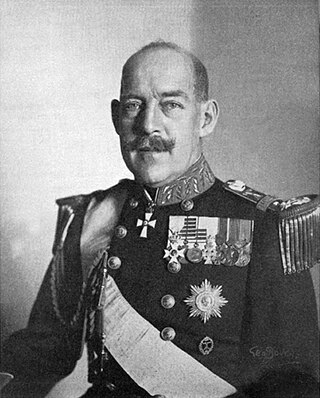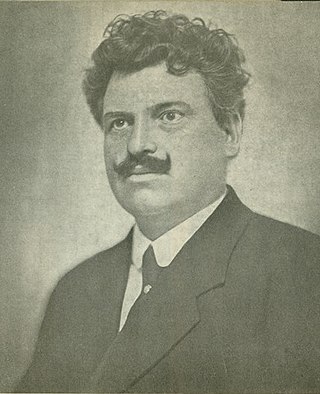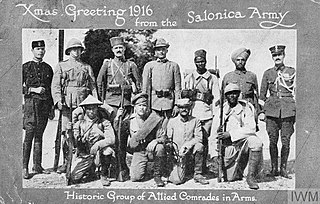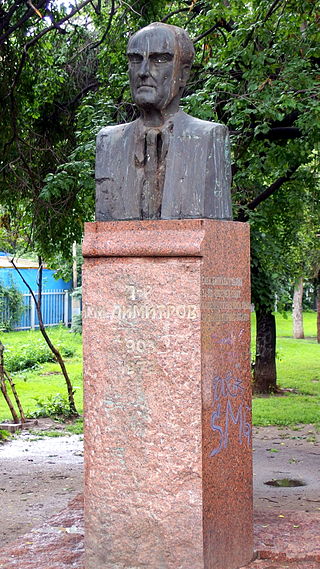| |||||||||||||||||||
| Results | |||||||||||||||||||
|---|---|---|---|---|---|---|---|---|---|---|---|---|---|---|---|---|---|---|---|
| |||||||||||||||||||
 |
|---|
A referendum for trying the culprits for the national catastrophes was held in Bulgaria on 19 November 1922. [1] It was approved by 74% of voters. [1]
| |||||||||||||||||||
| Results | |||||||||||||||||||
|---|---|---|---|---|---|---|---|---|---|---|---|---|---|---|---|---|---|---|---|
| |||||||||||||||||||
 |
|---|
A referendum for trying the culprits for the national catastrophes was held in Bulgaria on 19 November 1922. [1] It was approved by 74% of voters. [1]
The ruling Bulgarian Agrarian National Union (BANU) sought to prosecute members of the cabinets of the governments led by Ivan Geshov, Stoyan Danev and Aleksandar Malinov motivated by the dissatisfaction of large parts of the populace with the outcome of the Balkan Wars and World War I for Bulgaria. After the wars, BANU and other opposition forces and intellectuals classified Bulgaria's territorial loses during 1913 and 1918 as national catastrophes — called in Bulgaria the First and Second national catastrophes, respectively. These terms were frequently used in Bulgaria during the Interwar period. On 24 September 1922 17 of the 22 ministers were arrested, and a law on prosecution was published on 17 October. [1]
| Choice | Votes | % | |
|---|---|---|---|
| For | 647,313 | 74.33 | |
| Against | 223,584 | 25.67 | |
| Total | 870,897 | 100.00 | |
| Valid votes | 870,897 | 93.77 | |
| Invalid votes | 2,286 | 0.25 | |
| Blank votes | 55,593 | 5.99 | |
| Total votes | 928,776 | 100.00 | |
| Source: Direct Democracy | |||

The Central Powers, also known as the Central Empires, were one of the two main coalitions that fought in World War I (1914–1918). It consisted of Germany, Austria-Hungary, the Ottoman Empire, and Bulgaria; this was also known as the Quadruple Alliance.

Constantine I was King of Greece from 18 March 1913 to 11 June 1917 and from 19 December 1920 to 27 September 1922. He was commander-in-chief of the Hellenic Army during the unsuccessful Greco-Turkish War of 1897 and led the Greek forces during the successful Balkan Wars of 1912–1913, in which Greece expanded to include Thessaloniki, doubling in area and population. The eldest son of George I of Greece, he succeeded to the throne following his father's assassination in 1913.

The Megali Idea is a nationalist and irredentist concept that expresses the goal of reviving the Byzantine Empire, by establishing a Greek state, which would include the large Greek populations that were still under Ottoman rule after the end of the Greek War of Independence (1821–1829) and all the regions that had large Greek populations.

Aleksandar Stoimenov Stamboliyski was a Bulgarian politician who served as the Prime Minister of Bulgaria from 1919 until 1923.

The Internal Macedonian Revolutionary Organization, was a secret revolutionary society founded in the Ottoman territories in Europe, that operated in the late 19th and early 20th centuries.

The Fatherland Front was a Bulgarian pro-communist political resistance movement, which began in 1942 during World War II. The Zveno movement, the communist Bulgarian Workers Party, a wing of the Bulgarian Agrarian National Union and the Bulgarian Social Democratic Workers Party all became part of the OF. The constituent groups of the OF had widely contrasting ideologies and had united only in the face of the pro-German militarist dictatorship in Bulgaria. At the beginning, the members of the OF worked together, without a single dominating group. Professional associations and unions could be members of the front and maintain their organisational independence. However, the Bulgarian Communist Party soon began to dominate. In 1944, after the Soviet Union had declared war on Bulgaria, the OF carried out a coup d'état and declared war on Germany and the other Axis powers. The OF government, headed by Kimon Georgiev of Zveno, signed a ceasefire treaty with the Soviet Union. In the summer of 1945 most of BANU led by Nikola Petkov and most of the Social-Democrats had left the OF and became a large opposition group which later on after the 1946 Grand National Assembly election would become a coalition named "Federation of the village and urban labour" with 99 MPs out of 465.

The Treaty of Neuilly-sur-Seine required Bulgaria to cede various territories, after Bulgaria had been one of the Central Powers defeated in World War I. The treaty was signed on 27 November 1919 at Neuilly-sur-Seine, France.

The Allies, or the Entente Powers, were an international military coalition of countries led by France, the United Kingdom, Russia, the United States, Italy, and Japan against the Central Powers of Germany, Austria-Hungary, the Ottoman Empire, and Bulgaria in World War I (1914–1918).
After the Russo-Turkish War of 1877–1878, the 1878 Treaty of Berlin set up an autonomous state, the Principality of Bulgaria, within the Ottoman Empire. Although remaining under Ottoman sovereignty, it functioned independently, taking Alexander of Battenberg as its first prince in 1879. In 1885 Alexander took control of the still-Ottoman Eastern Rumelia, officially under a personal union. Following Prince Alexander's abdication (1886), a Bulgarian Assembly elected Ferdinand I as prince in 1887. Full independence from Ottoman control was declared in 1908.

The Tsardom of Bulgaria, also referred to as the Third Bulgarian Tsardom, sometimes translated in English as the "Kingdom of Bulgaria", was a constitutional monarchy in Southeastern Europe, which was established on 5 October 1908, when the Bulgarian state was raised from a principality to a tsardom.

The Balkans theatre or Balkan campaign was a theatre of World War I fought between the Central Powers and the Allies.

The Macedonian front, also known as the Salonica front, was a military theatre of World War I formed as a result of an attempt by the Allied Powers to aid Serbia, in the autumn of 1915, against the combined attack of Germany, Austria-Hungary and Bulgaria. The expedition came too late and with insufficient force to prevent the fall of Serbia and was complicated by the internal political crisis in Greece. Eventually, a stable front was established, running from the Albanian Adriatic coast to the Struma River, pitting a multinational Allied force against the Bulgarian army, which was at various times bolstered with smaller units from the other Central Powers. The Macedonian front remained stable, despite local actions, until the Allied offensive in September 1918 resulted in Bulgaria capitulating and the liberation of Serbia.

Nikola Todorov Zhekov was the Minister of War of Bulgaria in 1915 and served as commander-in-chief from 1915 to 1918 during World War I.

The 1923 Bulgarian coup d'état, also known as the 9 June coup d'état, was a coup d'état in Bulgaria implemented by armed forces under General Ivan Valkov's Military League on the evening of 9 June 1923. Hestitantly legitimized by a decree of Tsar Boris III of Bulgaria, the coup overthrew the elected government headed by Aleksandar Stamboliyski of the Bulgarian Agrarian National Union, and replaced it with one under Aleksandar Tsankov.

Nikolaos Stratos was a Prime Minister of Greece for a few days in May 1922. He was later tried and executed for his role in the Catastrophe of 1922.
The Negotiations of Bulgaria with the Central Powers and the Entente were attempts of the two belligerents in World War I, the Central Powers and the Entente to involve Bulgaria in the war on their side. They are also called The Bulgarian Summer of 1915.

Georgi Mihov Dimitrov, known as Gemeto to distinguish him from Georgi Dimitrov Mihaylov, was a Bulgarian politician, a leading figure of the Bulgarian Agrarian National Union during the 1930s and 1940s, and an opponent of fascism and communism alike.

The abolition of the Ottoman sultanate by the Grand National Assembly of Turkey on 1 November 1922 ended the Ottoman Empire, which had lasted from c. 1299. On 11 November 1922, at the Conference of Lausanne, the sovereignty of the Grand National Assembly exercised by the Government in Angora over Turkey was recognized. The last sultan, Mehmed VI, departed the Ottoman capital, Constantinople, on 17 November 1922. The legal position was solidified with the signing of the Treaty of Lausanne on 24 July 1923. In March 1924, the Caliphate was abolished, marking the end of Ottoman influence.

Rayko Ivanov Daskalov was a Bulgarian interwar politician of the Bulgarian Agrarian National Union (BANU). One of the chief leaders of the republican Vladaya Uprising organised by deserted Bulgarian Army troops in 1918 against the government, from 1919 to 1923 Daskalov was a prominent member of the BAPU governments which were in power in Bulgaria in the early post-World War I period.

The Constitutional Bloc was a political alliance in Bulgaria in the early 1920s. It was formed by parties that opposed the ruling Bulgarian Agrarian National Union (BANU) in the early 1920s.